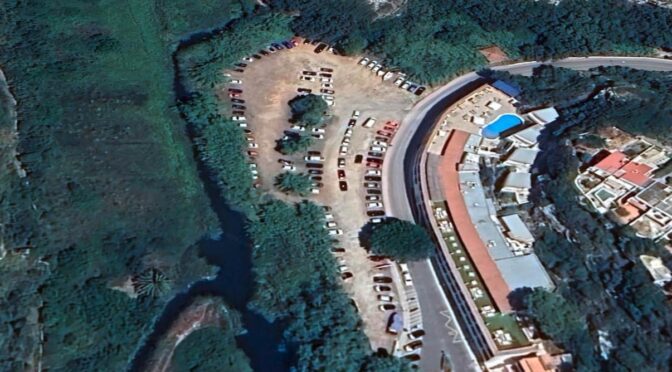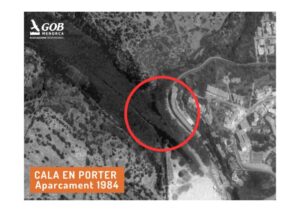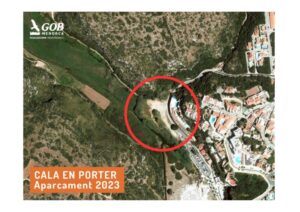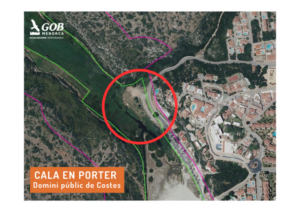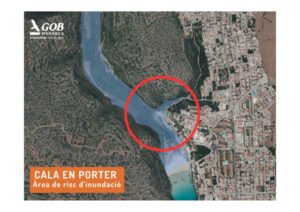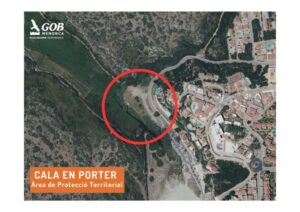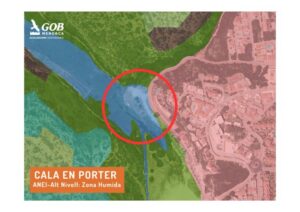Views: 995
The recent controversy over the parking area next to the Cala en Porter torrent is a case where the administrations are acting against current legislation. The GOB has approached various public institutions to request their intervention.
The area to the right as the coastline ends at the end of the beach is a piece of land that forms part of the public maritime land domain. It is also a Natural Area with a High Level of protection (ANEI) , it is catalogued as a wetland area, it is listed as a Flood Risk Hazard Area, has special protection as it is located in the Area of Territorial Protection of 500 metres from the coast and forms part of the European Network of protected areas “Natura 2000”, in the category of Site of Community Interest -LIC- and Special Protected Area for the Birds -ZEPA- (see attached illustrations).
Each of the aforementioned figures prohibits parking according to different rules. A car park that has been operating due to administrative oversight, but which takes a different turn when it is a public administration – in this case, Alaior Town Council – that acts with unusual urgency to re-establish vehicle access to a protected area.
Questions to the institutions involved
A reminder that the landowner blocked the vehicle access to the area in question by placing rocks that allowed people to pass but not cars. It is unknown what authority said individual might have had to carry this out, but the municipal action of removing the boulders to allow cars to park there represents an active institutional stance that is in direct contradiction to a number of laws.
For these reasons, the GOB has asked in writing if the marine coast authority (La Dirección General de la Costa y el Mar) has authorised the City Council to carry out an action with machinery on public land with the aim of allowing vehicles to park there. Because this contradicts the Law and the Regulation of Marine Coasts that say that, in case of need for parking, it must always be placed outside the traffic service, that is to say, outside the public domain.
GOB has also contacted the department that manages the Natura 2000 network to find out if any report has been drawn up that contradicts what is regulated by these areas protected by Europe. It should be remembered that the Law on Natural Heritage and Biodiversity states that appropriate measures must be taken in LICs and ZEPAs to prevent deterioration, pollution, habitat fragmentation and disturbance.
A letter has also been sent to the Directorate General of Environmental Assessment of the Balearic Government to find out whether the body that replaces the Environmental Commission has reported on the environmental impact assessment of the car park, which is located in rural land under special protection.
A letter has also been sent to the Island Council to find out if this car park has been declared of general interest and if the island institution has issued any kind of report on the removal of rocks to allow the car park, given that the Law on Natural Spaces, the Territorial Planning Directives, the Biosphere Reserve Law and the Island Territorial Plan do not allow parking in an area of this category.
Each of these administrations has been asked for an act of compliance with the law in order to apply the legislation in force and to inform whether they have issued any kind of pronouncement in favour of the municipal initiative tending to actively permit the parking of vehicles in an area that is not permitted by so many different regulations.
24 hours for Cala en Porter, 5 years for illegal swimming pools
Many people have been surprised by the speed with which the Alaior Town Council has acted, acting in an area that is not really within its competence and where, as has already been said, it is not possible to park legally. It was not even 24 hours between the time that this landowner placed rocks on the perimeter of the protected area and the time that the Town Council removed them.
On the other hand, five years ago, illegal swimming pools were denounced by town planning and environmental inspectors, and the Alaior Town Council has not yet had the time to decide whether or not they can be legalised. However, the swimming pools, which were supposed to be water deposits to save water in the planning documents, continue to form part of the Torre Vella agritourism offer.

